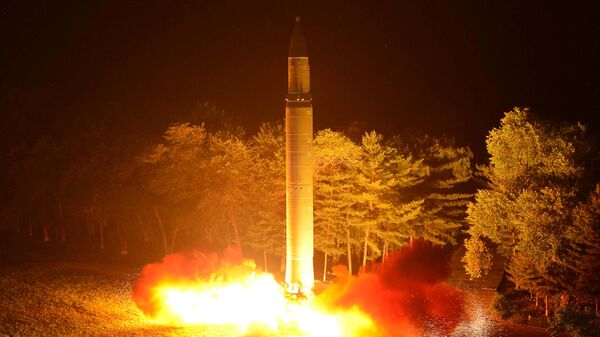“It is now clear that North Korea is on the way to building a nuclear missile potential and sooner or later it will have nuclear warhead able to fly far and reach the United States which Pyongyans considers to be as its main adversary. I’m not ruling out the possibility that North Korean missiles will eventually be able to hit Alaska or Hawaii,” Lukin said.
It was the first nighttime ballistic missile launch by North Korea. According to South Korean military sources, the missile flew about 1,000 kilometers (631 miles) reaching an altitude of 3,700 kilometers (2,300 miles).
In an interview with Sputnik, Artyom Lukin said that the new North Korean missile is able to hit faraway targets, including those on the other side of the ocean.
“If what Pyongyang says is anything to go by, the missiles reached a high altitude and flew longer and farther. This means that if launched along a different trajectory, it would have reached the United States,” he noted.
He quoted US Secretary Rex Tillerson as saying being the only two major powers maintaining economic and political ties with North Korea, China and Russia are responsible for its behavior.
“The US believes that China and Russia should bring pressure to bear on Pyongyang. However it looks like neither of them is going to do this. How can Russia possibly support US sanctions on North Korea now that Russia itself is under US sanctions?” the expert wondered.
"I think that as a permanent member of the UN Security Council, Russia will hardly allow any tough sanctions against Pyongyang. The Americans are free to introduce unilateral sanctions, but we know from experience that one-sided sanctions don't work if they are not supported by China and Russia," Artyom Lukin concluded.
North Korea’s Friday night launch was the second ICBM test in less than a month.
The test immediately prompted sharp criticism from the international community.
North Korea has been sharply criticized by the United States, South Korea and Japan for violating UN resolutions, while China has called for caution to prevent tensions from escalating.




